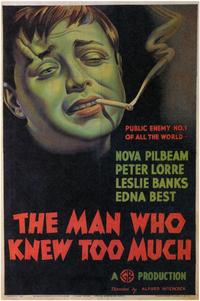239) The Paradine Case (1947) Dir: Alfred Hitchcock Date Released: January 8, 1948 Date Seen: July 28, 2012 Rating: 3.75/5
I didn't read up on The Paradine Case before I checked it out at the IFC Center and I'm glad I didn't. The reputation that surrounds the last Selznick/Hitchcock collaboration is a bit dispiriting. Until Farran Nehme Smith said she also liked the film, I felt rather freakish for enjoying this courtroom melodrama. And now I feel even more silly for having ever felt silly in the first place! The Paradine Case is, for my money, not only typically well-directed but also admirably tense and well-acted. I've heard a couple of people say that some of its cast were, um, mis-cast, particularly Gregory Peck, but I don't see it. Peck plays a hot-shot and a pillar of virtue whose fascination with Alida Valli, whose performance reminded me of Simone Simon's in Cat People (1942), concerns and worries everyone around him. I can't comment in depth about why other people felt this because again, I have avoided reading anything except the opinions I solicited on Twitter. But I never felt like Peck didn't play his part well or that he was the wrong man for his role.
Also: Charles Laughton was perfect as the corrupt judge Peck's character has to convince. And the ladies in this film really impressed me. I absolutely loved Ann Todd as Peck's perceptive but doting wife, particularly when she gives that worried speech to him about how he doesn't really love Valli. And Ethel Barrymore's impassioned speech to Laughton at the end was really moving, even if the speech itself is a bit pokey.
I don't know, I feel like the film's plot may be a bit contrived and its main thematic revelations--a damsel in distress does not always need rescuing and a cavalier affair based on projection is doomed to failure--are ho-hum, but only when considered in the abstract. While I was watching this film, I was totally absorbed. Two hours really did fly.




